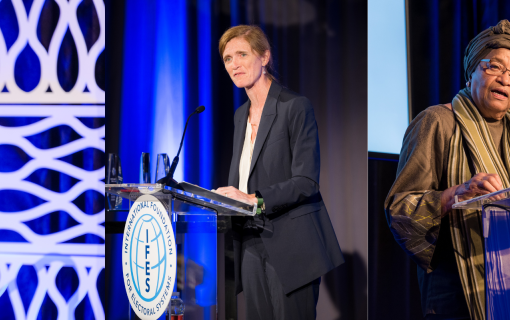Anthony "Tony" Banbury joined the International Foundation for Electoral Systems (IFES) as President and Chief Executive Officer on November 1, 2018. Prior to joining IFES, Tony had an extensive career working for the UN and the United States government.
Banbury worked for the UN for 20 years in a variety of roles both at UN headquarters in New York and in the field. From 2009 through 2016, Banbury served as Assistant Secretary-General for Field Support; in this role, he was responsible for providing operational support to more than 30 UN peacekeeping and political missions around the world with a combined annual budget of more than $8 billion and with more than 170,000 deployed personnel. While working at UN headquarters, Banbury was given a number of special assignments by the Secretary-General, including designing and leading the UN’s first-ever emergency health mission in response to the 2014 West Africa Ebola crisis, designing and establishing the Joint Organisation for the Prohibition of Chemical Weapons-UN Mission to remove chemical weapons from Syria in 2013, leading the effort to stop widespread killings and prevent genocide in the Central African Republic in 2014, and leading the operational response to the 2010 Haiti earthquake, the worst humanitarian disaster in the western hemisphere in modern history.
Banbury previously served as Asia Regional Director for the UN World Food Programme from 2003 to 2009, where he oversaw operations in 14 countries, including Afghanistan and North Korea, and led the organization’s operational response to the Indian Ocean tsunami and Cyclone Nargis in Myanmar. Banbury started his UN career in 1988 as a Human Rights Officer in Cambodian refugee camps in Thailand and later served in various humanitarian, political affairs, and human rights positions in Asia, the Balkans during the war in the former Yugoslavia, and UN headquarters.
Prior to his most senior roles with the UN, Banbury worked in the United States government as Director and then Senior Director for Democracy, Human Rights, and International Operations at the National Security Council (2000-2003) and Senior Policy Advisor in the Balkans Task Force at the Department of Defense (1998-2000).
Banbury holds a master’s degree in law and diplomacy from the Fletcher School of Law and Diplomacy at Tufts University, a graduate degree in international relations from the Institut Universitaire de Hautes Études Internationales at the University of Geneva, and a bachelor’s degree in political science from Tufts University.
Banbury is a member of the Board of Directors of the Centre for Public Impact and received a Distinguished Service Award from the President of the United States for service on 9/11, a Bronze Palm to the Exceptional Civilian Service Award from the Secretary of Defense, an Exceptional Civilian Service Award from the Office of the Secretary of Defense, and a Distinguished Alumni Achievement Award from Tufts University.
Banbury speaks varying degrees of French, Thai, and Cambodian. He lived abroad for more than 12 years in eight countries in Africa, Asia, and Europe and has done working visits to over 70 countries during his career.
Public Health and Crisis Expertise Summary
In 2014, Anthony Banbury designed and led the United Nations' (UN) first-ever emergency health mission in response to the 2014 West Africa Ebola crisis. He served as Special Representative of the Secretary-General and Head of the UN Mission for Ebola Emergency Response (UNMEER). Appointed to this position near the peak of the Ebola crisis, Banbury designed the UN systemwide operational response and led its implementation; by the time he left, the Ebola caseload had reduced significantly, and the crisis phase was largely over.
Just prior to serving on UNMEER, Banbury was appointed by the UN Secretary-General in January 2014 as the UN Central African Republic Crisis Manager at a time of widespread violence, population displacement, and risk of genocide. Banbury developed a six-point plan for the Secretary-General that was approved by the UN Security Council and contributed to the abatement of the crisis. Banbury also designed and established the Joint Organisation for the Prohibition of Chemical Weapons-UN Mission to remove chemical weapons from Syria in 2013 and led the UN’s operational response to the 2010 Haiti earthquake. As Asia Regional Director for the UN World Food Programme, he was an integral part of the relief operations for the 2004 tsunami and the 2008 Cyclone Nargis.









